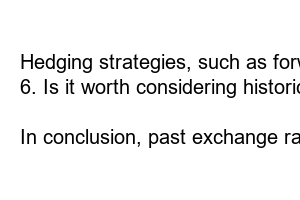과거 환율조회
Title: Past Exchange Rate Inquiry: Understanding the Dynamics of Currency Fluctuations
Introduction:
When it comes to international trade and finance, understanding exchange rates is of utmost importance. Exchange rates play a pivotal role in determining the value of one currency against another, influencing everything from traveling expenses to import costs. In this blog post, we delve into the intricacies of past exchange rate inquiry, shedding light on the factors that drive fluctuations and uncovering the significance of historical rates for informed decision-making.
1. What are exchange rates and why do they fluctuate?
Exchange rates represent the value of one currency when compared to another. Fluctuations in exchange rates occur due to various factors such as interest rates, inflation, government policies, market speculation, and supply and demand dynamics. These fluctuations impact international trade and investment, as well as the cost of living and travel.
2. Understanding the impact of historical exchange rates:
Analyzing past exchange rates allows us to identify trends, patterns, and potential future fluctuations. Studying historical data helps investors, businesses, and individuals make informed decisions, whether it is regarding foreign investments, travel plans, or trade agreements. Historical exchange rates provide valuable insights into the relative strength or weakness of different currencies.
3. The role of central banks and monetary policies:
Central banks play a vital role in maintaining stable exchange rates. They often intervene in the foreign exchange market to influence the value of their currency. By adjusting interest rates, conducting open market operations, or engaging in direct currency interventions, central banks attempt to manage exchange rate volatility and promote economic stability.
4. Impact of economic indicators on exchange rates:
Economic indicators such as GDP growth, inflation rates, employment data, and trade balances significantly influence exchange rates. Strong economic indicators can lead to a strengthening currency, while weaker economic performance may result in a depreciation. Understanding the interplay between economic indicators and exchange rates is crucial for making well-informed financial decisions.
5. Global events and geopolitical factors:
Geopolitical events and developments on the global stage have a significant impact on exchange rates. Political instability, conflicts, trade disputes, and policy changes can lead to sudden currency fluctuations. Staying aware of global events can help individuals and businesses anticipate potential exchange rate movements and mitigate risks.
6. Future trends and forecasting:
While it is impossible to predict exchange rate movements with complete certainty, various forecasting techniques and models are employed to estimate future trends. Technological advancements and access to vast amounts of data have improved these forecasting capabilities, enabling individuals and businesses to make more accurate predictions and better plan for the future.
Frequently Asked Questions (FAQs):
1. How often do exchange rates change?
Exchange rates can change multiple times in a single day, depending on market conditions and economic news.
2. Can I save money by timing my currency exchanges?
Timing currency exchanges based on short-term trends can be unpredictable and risky. It is advisable to focus on long-term currency trends for more reliable decision-making.
3. Which factors have the most significant impact on exchange rates?
Interest rates, inflation, economic performance, geopolitical events, and monetary policies are among the most influential factors affecting exchange rates.
4. Where can I find historical exchange rate data?
Many financial institutions, central banks, and online platforms provide access to historical exchange rate data.
5. How can I protect myself against exchange rate fluctuations?
Hedging strategies, such as forward contracts and options, allow individuals and businesses to protect themselves against adverse exchange rate movements.
6. Is it worth considering historical exchange rates before traveling to a different country?
Considering historical exchange rates can help individuals budget for travel expenses and make informed decisions on exchanging currency.
Summary:
In conclusion, past exchange rate inquiries are vital for understanding the dynamics of currency fluctuations. By evaluating historical data, considering economic indicators and geopolitical factors, and utilizing forecasting techniques, individuals and businesses can make more informed decisions regarding international trade, investments, and travel planning. Stay informed and adapt to the ever-changing nature of exchange rates to navigate global financial markets with confidence.

